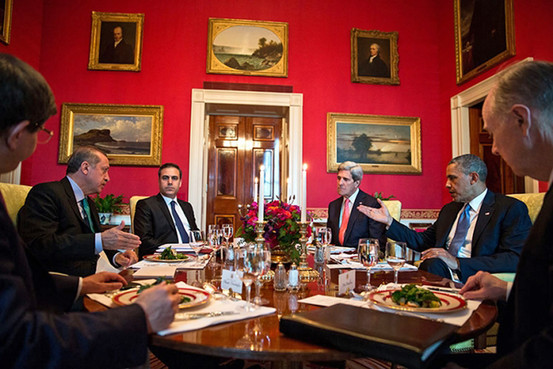 “Hakan Fidan [Turkey’s powerful spymaster] is the face of the new Middle East,” says James Jeffrey, who recently served as U.S. ambassador in Turkey and Iraq. “We need to work with him because he can get the job done,” he says. “But we shouldn’t assume he is a knee-jerk friend of the United States, because he is not. . . .”
“Hakan Fidan [Turkey’s powerful spymaster] is the face of the new Middle East,” says James Jeffrey, who recently served as U.S. ambassador in Turkey and Iraq. “We need to work with him because he can get the job done,” he says. “But we shouldn’t assume he is a knee-jerk friend of the United States, because he is not. . . .”
Mr. Fidan’s rise to prominence has accompanied a notable erosion in U.S. influence over Turkey. Washington long had cozy relations with Turkey’s military, the second-largest army in the North Atlantic Treaty Organization. But Turkey’s generals are now subservient to Mr. [Turkish Prime Minister Recep Tayyip] Erdogan and his closest advisers, Mr. Fidan and Foreign Minister Ahmet Davutoglu, who are using the Arab Spring to shift Turkey’s focus toward expanding its regional leadership, say current and former U.S. officials. . . .
Mr. Fidan’s ascension is remarkable in part because he is a former noncommissioned officer in the Turkish military, a class that usually doesn’t advance to prominent roles in the armed forces, business or government.
Mr. Fidan earned a bachelor of science degree in government and politics from the European division of the University of Maryland University College and a doctorate in political science from Ankara’s elite Bilkent University. In 2003, he was appointed to head Turkey’s international-development agency.
He joined Mr. Erdogan’s office as a foreign-policy adviser in 2007. Three years later, he was head of intelligence.
“He is my secret keeper. He is the state’s secret keeper,” Mr. Erdogan said of his intelligence chief in 2012 in comments to reporters. . . .
U.S. officials believe the MIT under Mr. Fidan passed several pieces of intelligence to Iran, including classified U.S. assessments about the Iranian government, say current and former senior U.S. and Middle Eastern officials. U.S. officials say they don’t know why Mr. Fidan allegedly shared the intelligence, but suspect his goal was relationship-building. After the Arab Spring heightened tensions, Mr. Erdogan pulled back from his embrace of Tehran, at which point U.S. officials believe Mr. Fidan did so, too. . . .
In 2012, Mr. Fidan began expanding the MIT’s power by taking control of Turkey’s once-dominant military-intelligence service. Many top generals with close ties to the U.S. were jailed as part of a mass trial and convicted this year of plotting to topple Mr. Erdogan’s government. At the Pentagon, the jail sentences were seen as the coup de grace for the military’s status within the Turkish system.
Mr. Fidan’s anti-Assad campaign harks to August 2011, when Mr. Erdogan called for Mr. Assad to step down. Mr. Fidan later started directing a secret effort to bolster rebel capabilities by allowing arms, money and logistical support to funnel into northern Syria—including arms from Saudi Arabia, Qatar and other Gulf allies—current and former U.S. officials say.
Mr. Erdogan wanted to remove Mr. Assad not only to replace a hostile regime on Turkey’s borders but also to scuttle the prospect of a Kurdish state emerging from Syria’s oil-rich northeast, political analysts say.
Providing aid through the MIT, a decision that came in early 2012, ensured Mr. Erdogan’s office had control over the effort and that it would be relatively invisible, say current and former U.S. officials.
Syrian opposition leaders, American officials and Middle Eastern diplomats who worked with Mr. Fidan say the MIT acted like a “traffic cop” that arranged weapons drops and let convoys through checkpoints along Turkey’s 565-mile border with Syria.
Some moderate Syrian opposition leaders say they immediately saw that arms shipments bypassed them and went to groups linked to the Muslim Brotherhood. Mr. Erdogan’s Islamist-rooted Justice and Development Party has supported Muslim Brotherhood movements across the region.
Syrian Kurdish leaders, meanwhile, charge that Ankara allowed arms and support to reach radical groups that could check the expanding power of Kurdish militia aligned with Turkey’s militant Kurdistan Workers’ Party.
Turkish border guards repeatedly let groups of radical fighters cross into Syria to fight Kurdish brigades, says Salih Muslim, co-chairman of the Democratic Union of Syria, Turkey’s most powerful Kurdish party. He says Turkish ambulances near the border picked up wounded fighters from Jabhat al Nusra, an anti-Assad group linked to al Qaeda. Turkish officials deny those claims. . . .
In meetings with American officials and Syrian opposition leaders, Turkish officials said the threat posed by Jabhat al Nusra, the anti-Assad group, could be dealt with later, say U.S. officials and Syrian opposition leaders. . . .
A former senior U.S. intelligence official says Mr. Fidan has built strong relationships with many of his international counterparts. At the same time, a current U.S. intelligence official says, it is clear “we look at the world through different lenses.”
Image: Obama and Kerry meet with Erdogan and Fidan, 2nd & 3rd from left. (photo: Pete Souza/White House)

